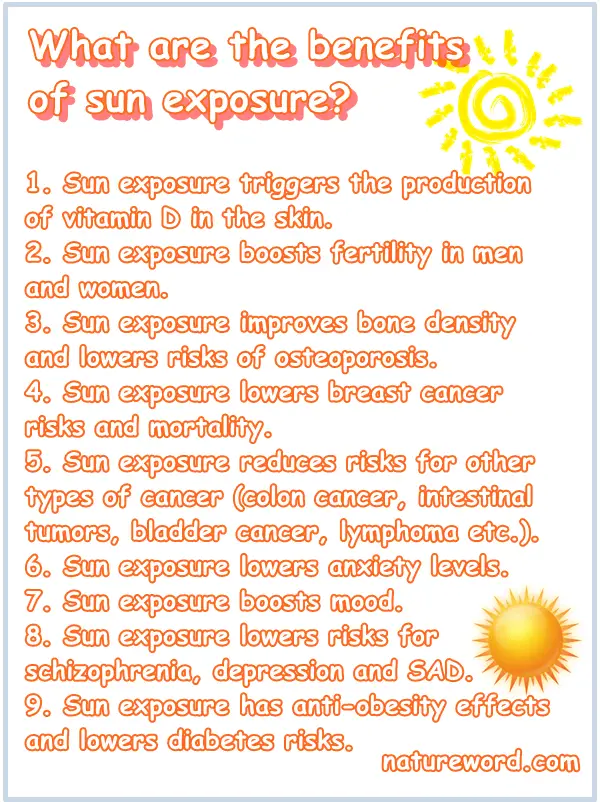Sun exposure is an important source of benefits for mental and physical health. From better mood and increased work productivity to lower depression and anxiety risks, sun exposure benefits varied aspects of mental health. As for physical health, the benefits range from lower risks of osteoporosis and bone fractures to improved fertility in women and better pregnancy outcomes to lower risks of cancer.
What is sun exposure good for?
Sun exposure triggers vitamin D production in the skin
Exposure to UVB sunlight induces synthesis of vitamin D in the skin and represents one of the main benefits of sun exposure. Vitamin D produced in the skin via sun exposure is called vitamin D3 or cholecalciferol, and is metabolized further in the body. The liver turns vitamin D3 from sun exposure into a form called calcifediol, 25-hydroxycholecalciferol or 25-hydroxyvitamin D3. The kidneys then convert it into calcitriol, 1,25-dihydroxycholecalciferol or 1,25-dihydroxyvitamin D. The last form is the biologically active form of vitamin D which functions as a hormone and binds to and activates vitamin D receptors throughout the body.

Sun exposure boosts fertility in women and men
Exposure of skin to sunlight triggers the production of vitamin D in the skin. There are receptors for vitamin D in the ovaries and uterus and other reproductive tissues and organs in both women and men. At these sites, vitamin D regulates reproductive processes, contributing to improved fertility. Studies show that, in women, vitamin D regulates the production of steroid hormones hormones estradiol and progesterone.
Estradiol is the dominant female hormone in adult women between puberty and menopause, essentially responsible for female fertility. Progesterone is another key female hormone whose main functions are to prepare the uterus to allow for the fertilized ovum to attach and pregnancy to start, as well as to maintain pregnancy. In men, vitamin D improves reproductive cells quality and androgen status (source).
Sun exposure is good for bones and lowers risks of osteoporosis
Exposure to sunlight induces production of vitamin D in the skin which is then metabolized to biologically active forms that can be used by the body. Vitamin D has been shown to hold important benefits for bones. For one, vitamin D is directly and meaningfully involved in regulating and maintaining calcium, magnesium and phosphate homeostasis, promoting bone mineralization for better bone density and reduced risks of bone demineralization, bone weakening and bone fractures.
Getting enough vitamin D, which can be achieved successfully via sun exposure, can prevent bone deformities such as rickets in children or osteomalacia in adults, and reduce risks of osteopenia and osteoporosis, and associated bone frailness and bone fractures.

Sun exposure can reduce breast cancer risks
Sufficient exposure to sunlight can help lower risks of breast cancer in women, a benefit owed at least in part to the role of sun exposure in vitamin D production. There is consistent evidence for an association between good vitamin D status and reduced risks of breast cancer.
Studies show vitamin D has a protective effect against breast cancer in premenopausal women of normal weight (source). For one, vitamin D plays a role in cell differentiation which is one way it may protect against developing breast cancer. Research shows vitamin D has anti-proliferative and pro-differentiation activity, and acts as a cancer chemo preventive agent (source).
Moreover, studies appear to indicate that higher intakes of vitamin D, and calcium, may be associated with a lower risk of developing premenopausal breast cancer; benefits may be more pronounced for more aggressive breast tumors (source). Vitamin D is also known to have significant immunomodulatory effects. For example, studies show it is a direct and indirect regulator of immune system cells called T cells (source).
In a study, women with a higher vitamin D status (greater than 27ng/mL) had a 27% reduced risk of breast cancer incidence compared to women with a lowest vitamin D status (less than 19.8 ng/mL)(source).
Observational studies further suggest that ‘higher sunlight exposure is related to a lower risk of having high risk breast density pattern in premenopausal women.’ Findings suggest a higher level of sunlight exposure can be associated with a significantly lower risk having high risk Tabár’s pattern at any age stage (source).
Sun exposure benefits for intestinal tumors and colon cancer
According to animal studies, sun exposure, or exposure to ultraviolet radiation from sunlight to be more exact, induces a reduction in intestinal tumors. The ‘UVR-induced reduction in intestinal cancer in mice could at least in part be attributed to vitamin D’. However, research also ‘found a reduced progression to malignancy as a result of UVR exposure which appeared not to be attributable to vitamin D.’ (source)
Other anticancer benefits
In a study, ‘serum 25-hydroxyvitamin D concentrations equal to or greater than 74 nmol/L were associated with a 60% lower risk of bladder cancer incidence’ (source). Research also suggests ‘there is a negative association between sun exposure and non-Hodgkin’s lymphoma risks and mortality’, lymphoma and prostate cancer, independent of vitamin D status.
Sun exposure is scientifically shown to boost mood
Sun exposure is a great natural remedy for low mood and can improve disposition. Exposure to sunlight has almost immediate benefits for disposition, inducing a feeling of wellbeing. This is because ‘sunlight affects brain serotonergic activity’, resulting in the production of neuro-hormones such as serotonin and beta-endorphins (source).
Studies show that beta-endorphin, the same neuro-hormone synthesized by the human body in response to exercise, which induces an addictive feeling of wellbeing, is also synthesized in response to sun exposure (source).
Sun exposure is good for mental health
Sun exposure can be associated with a reduced incidence of mental illness, including anxiety, depression, seasonal affective disorder (SAD) and schizophrenia. This is because exposure to sunlight radiation modulates brain serotonergic activity, inducing the release of specific neurohormones that modulate mood and disposition, as well as regulate brain activity.
Research has identified serotonin and beta-endorphins as two byproducts of sun exposure. These byproducts both regulate mood, improving disposition, and exert analgesic effects, inducing an addictive feeling of wellbeing. It has been postulated that sun exposure triggers the release of specific neurohormones as a natural reward mechanism that encourages further sun exposure.
Sun exposure increases work productivity
Job satisfaction and, consequently, work productivity are impacted by lack of exposure to natural elements. Exposure to sunlight and other nature elements, such as natural environments or green spaces, have been shown to trigger the release of serotonin and endorphins which induce a physiological state of wellbeing, reduce blood pressure and lower anxiety levels.
This has beneficial effects on work productivity by reducing stress and mental fatigue, improving concentration and increasing the capacity for attention, inducing calm and boosting mood, all of which improve job satisfaction. The restorative mental effect of sun exposure and other nature elements boosts mental health and enhances physiological wellbeing which is the foundation for good work productivity (source).
Sun exposure holds benefits for sleep
Studies show sun exposure helps regulate circadian rhythms and modulates sleep patterns, resulting in benefits for sleep duration and sleep quality. The benefits are owed, at least in part, to sun exposure inducing the production of vitamin D, triggering the release of serotonin, beta-endorphins and other hormone-type agents, and modulating their metabolism. These activities induce a feeling of wellbeing, lower stress and anxiety levels, blood pressure numbers, and boost mood, favoring falling asleep and staying asleep, and contributing to better sleep quality.
Sun exposure is good for cognitive function
Studies show ‘long-term high sun exposure is positively related with better cognitive functioning’ (source). The benefits of sun exposure for cognitive function have to do, at least in part, to sun exposure inducing the production of vitamin D.
Moreover, vitamin D has been shown to be involved in neurotransmission and the production of various neuro-hormones, as well as regulate the nutrition, metabolism and growth of neural tissue. As a result, it has been postulated that adequate levels of vitamin D are needed to maintain cognitive function and, considering sun exposure is the main source of vitamin D production, sufficient sun exposure is needed for good cognitive function.
Research has discovered receptors for vitamin D in the brain (source). Also, studies have identified a reduced number of vitamin D receptors in the brain of Alzheimer’s patients which further reinforces the hypothesis that adequate vitamin D levels are needed to maintain long-term cognitive function, which can be achieved through sufficient and safe sun exposure. There is even research suggesting that sufficient vitamin D levels achieved via sunlight exposure can lower risks of Parkinson’s (source).
Sun exposure lowers high blood pressure
Sun exposure is a source of anti-hypertensive benefits, helping lower high blood pressure numbers. For one, exposure to sunlight triggers the release of endorphins which lower stress levels, reduce anxiety and induce calm, contributing towards an anti-hypertensive effect.
Studies show sun exposure triggers the release of nitric oxide from dermal storage sites into the bloodstream, via ultraviolet radiation (UVB), which results in vasodilating and blood pressure lowering effects. Additionally, vitamin D synthesized as a result of sun exposure facilitates absorption of calcium which is ‘effective in reducing blood pressure in various states of hypertension, including pregnancy-induced hypertension and preeclampsia’ (source).
Sun exposure has anti-obesity benefits
Being outdoors, especially in warm weather with sufficient sunlight, typically translates into some level of physical activity being performed and suggests an active lifestyle that is supportive of weight control. Additionally, animal studies suggest sun exposure can significantly suppress weight gain. The effects are dependent on UVR-induced mediators such as nitric oxide which is released from dermal storage sites into the bloodstream as a result of exposure to ultraviolet radiation (UVB) from sunlight.
Sun exposure lowers diabetes risks
It has been postulated that sun exposure can potentially contribute to lower risks of developing type 2 diabetes and even type 1 diabetes. Animal studies demonstrated that long-term ‘UVR exposure significantly suppressed weight gain, glucose intolerance and insulin resistance’, all markers for type 2 diabetes.
Sun exposure has also been found to further suppress the development of obesity and metabolic syndrome. In a cumulative effect, these activities translate into lower risks for type 2 diabetes (source).
Moreover, according to research, low levels of the active form of vitamin D, 25(OH)D ‘are associated with type 2 diabetes independently of BMI’ (source). This suggests sun exposure protects against diabetes development through pathways other than vitamin D production.
Vitamin D and other metabolites produced as a result of sun exposure can also enhance immunotolerance which causes some degree of immunosuppression. Immunosuppression explains the reduction in type 1 diabetes risks, as well as risks of other autoimmune diseases such as multiple sclerosis.
Sun exposure modulates the immune system
Research reveals sun exposure has a strong and varied immune system modulating action. For example, sun exposure stimulates the production and supports the activities of T cells such as regulatory T-cells, myeloid cells and other immune cells. It enhances the secretion of anti-inflammatory Interleukin 10 cytokines and reduces the secretion of inflammatory Interleukin 17 cytokines.
At the same time, sun exposure can result in local or systemic immune system suppression which can have positive implications for autoimmune disorders such as type 1 diabetes and multiple sclerosis.
